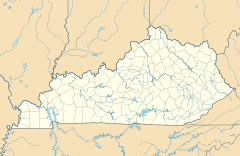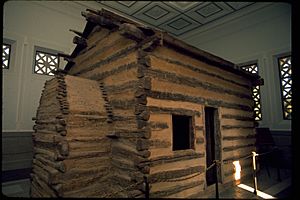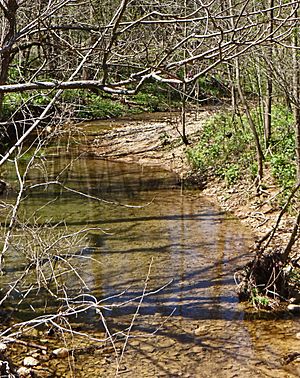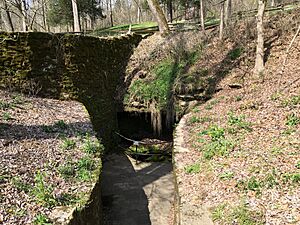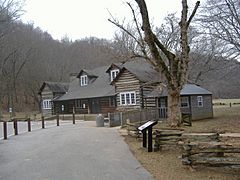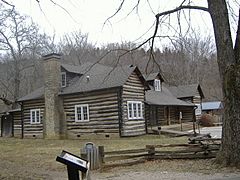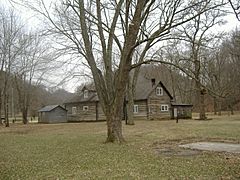Abraham Lincoln Birthplace National Historical Park facts for kids
|
Abraham Lincoln Birthplace National Historical Park
|
|
|
Former U.S. National Historic Site
|
|
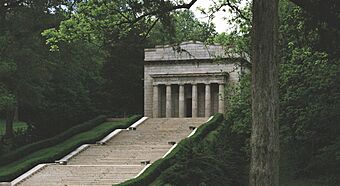
The Memorial Building was dedicated in 1911
|
|
| Location | LaRue County, Kentucky, U.S. |
|---|---|
| Area | 344.50 acres (139.41 ha) |
| Visitation | 252,495 (2016) |
| Website | Abraham Lincoln Birthplace National Historical Park |
| NRHP reference No. | 66000066 |
Quick facts for kids Significant dates |
|
| Established | July 17, 1916 |
| Designated NHS | September 8, 1959 |
| Designated NHP | October 15, 1966 |
Abraham Lincoln Birthplace National Historical Park is a special place in LaRue County, Kentucky. It protects two different farm sites where Abraham Lincoln, one of America's most famous presidents, was born and lived as a young child.
Lincoln was born at the Sinking Spring site. This is south of Hodgenville. His family moved to the Knob Creek Farm when he was two years old. This farm is northeast of Hodgenville. He lived there until he was seven. Today, the park's main visitor center is at the Sinking Spring site.
Contents
Sinking Spring Farm: Lincoln's Birthplace
In late 1808, Thomas and Nancy Lincoln settled on Sinking Spring Farm. Just two months later, on February 12, 1809, Abraham Lincoln was born there. He was born in a simple one-room log cabin.
Today, this important site is located at 2995 Lincoln Farm Road in Hodgenville, Kentucky. A special building, called the First Lincoln Memorial, protects a cabin. This cabin is a symbol of the one where Lincoln was born. The site also has a Visitor Center for guests.
The Memorial Building
A beautiful Memorial Building was designed for Lincoln's birthplace. It has a grand, classic style. The building's cornerstone was laid on February 12, 1909. This was 100 years after Lincoln's birth. President Theodore Roosevelt helped with this event.
The building was officially opened on November 9, 1911. President William Howard Taft was there. Inside, you'll find a log cabin. This cabin represents the one where Lincoln was born. The Memorial Building has 16 windows, 16 rosettes on the ceiling, and 16 fence poles. These all remind us that Lincoln was the 16th president. The 56 steps leading to the entrance show his age when he passed away.
The Symbolic Log Cabin
The original log cabin where Lincoln was born was taken apart before 1865. People in the area believed some of its logs were used in another house nearby. Later, a businessman bought the Lincoln farm. He used logs from that nearby house to build a cabin. This new cabin looked like the original one.
This cabin was then moved and shown in many cities. Eventually, the logs from this cabin were bought by a group called the Lincoln Farm Association (LFA). They thought they had found Lincoln's original logs. But when they tried to rebuild it, they found out there were logs from other cabins mixed in. The LFA then bought a different one-room cabin. This cabin was similar to what Lincoln's birthplace would have looked like. When this last rebuilt cabin was placed in the Memorial Building, it was a bit too big. So, the LFA made it a little smaller.
The cabin you see today is a "Symbolic Birth Cabin." It represents the one Abraham Lincoln was born in. While the actual original cabin is gone, the logs in this cabin are from the 1840s. It shows what a typical cabin from the mid-1800s would have looked like.
Knob Creek Farm: Lincoln's Childhood Home
|
Lincoln Boyhood Home
|
|
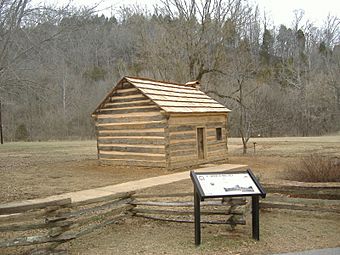
The "Gollaher Cabin" sits on the Knob Creek site where Lincoln lived.
|
|
| Nearest city | Athertonville, Kentucky |
|---|---|
| Built | 1931 |
| Architect | Thompson, Robert |
| Architectural style | Single pen log cabin |
| NRHP reference No. | 88002531 |
| Added to NRHP | November 16, 1988 |
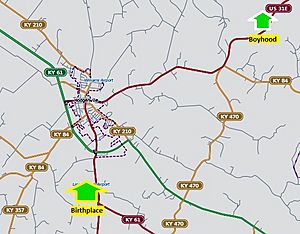
Lincoln lived at Sinking Spring until he was two years old. Then, his family moved a few miles northeast to Knob Creek Farm. This farm was near what is now U.S. Highway 31E. Abraham lived here until he was seven years old, in 1816.
Life at Knob Creek
Knob Creek Farm was about 228 acres in total. The Lincolns lived on about 30 acres of this land. Lincoln's father, Thomas, rented this land. He hoped to get back the Sinking Spring Farm, where Abraham was born.
While at Knob Creek, Lincoln's younger brother, Thomas, was born and sadly passed away. Abraham himself almost drowned in the nearby creek. Luckily, his friend and neighbor, Austin Gollaher, saved him. In December 1816, when Lincoln was almost eight, his family moved to Indiana. That homestead is now the Lincoln Boyhood National Memorial.
The actual cabin the Lincolns lived in at Knob Creek was later moved. Austin Gollaher took it down and used the logs to build a horse stable. Years later, a flood washed the stable away.
The Gollaher Cabin and Lincoln Tavern
Today, there are two historical buildings at the Knob Creek site. These are the Lincoln Tavern and the Gollaher Cabin. The Tavern was built in 1933. It was made of logs and concrete.
The Gollaher Cabin was likely built around 1800. It was moved to its current spot to show what the Lincoln cabin might have looked like. People believe this was the cabin where Austin Gollaher's family lived. The tavern was built to attract tourists. Many people came to LaRue County to see places connected to Lincoln. The tavern was first a dance hall. Later, it became a museum and gift shop. It closed in 1998.
The Knob Creek Farm was added to the National Register of Historic Places on November 16, 1988. This was because of its role in tourism and its connection to Abraham Lincoln. The Knob Creek site became part of the National Park in November 2001.
How the Park Was Created
The Memorial Building at the Sinking Spring site was built between 1909 and 1911. It was built by the Lincoln Farm Association. In 1916, they gave the Memorial and the land to the U.S. government. This created the Abraham Lincoln National Park on July 17, 1916.
The War Department managed the site until 1933. Then, it was moved to the National Park Service. It was renamed the Abraham Lincoln National Historical Park in 1939. Later, in 1959, it became the Abraham Lincoln Birthplace National Historic Site. Like all historic sites managed by the National Park Service, it was listed on the National Register of Historic Places in 1966. The park grew to include the Knob Creek site in 1998. On March 30, 2009, both sites together were again named a National Historical Park.
Park Facilities Today
The Sinking Spring site has the 1911 memorial building. It also has a visitor center with a museum, a theater, and a bookstore. The Knob Creek site has park staff during some summer days. Both sites offer hiking trails and picnic areas for visitors to enjoy.
Gallery
See also
 In Spanish: Parque histórico nacional lugar de nacimiento de Abraham Lincoln para niños
In Spanish: Parque histórico nacional lugar de nacimiento de Abraham Lincoln para niños
 | Lonnie Johnson |
 | Granville Woods |
 | Lewis Howard Latimer |
 | James West |


